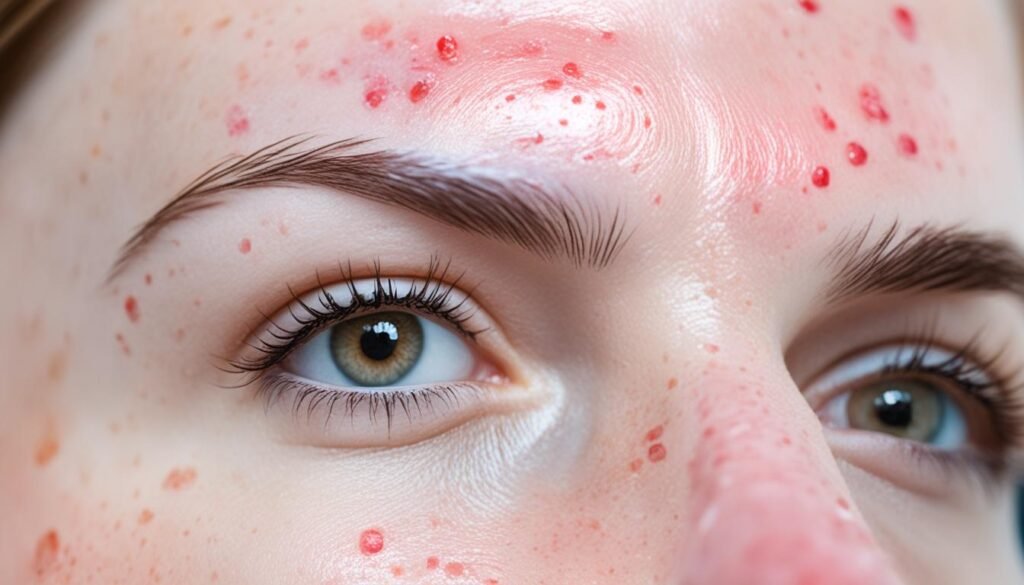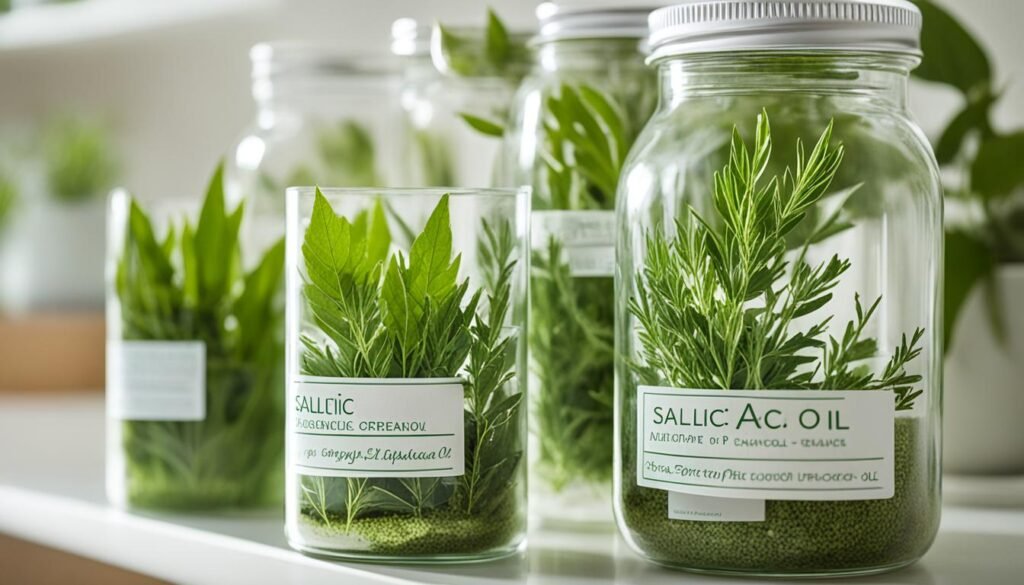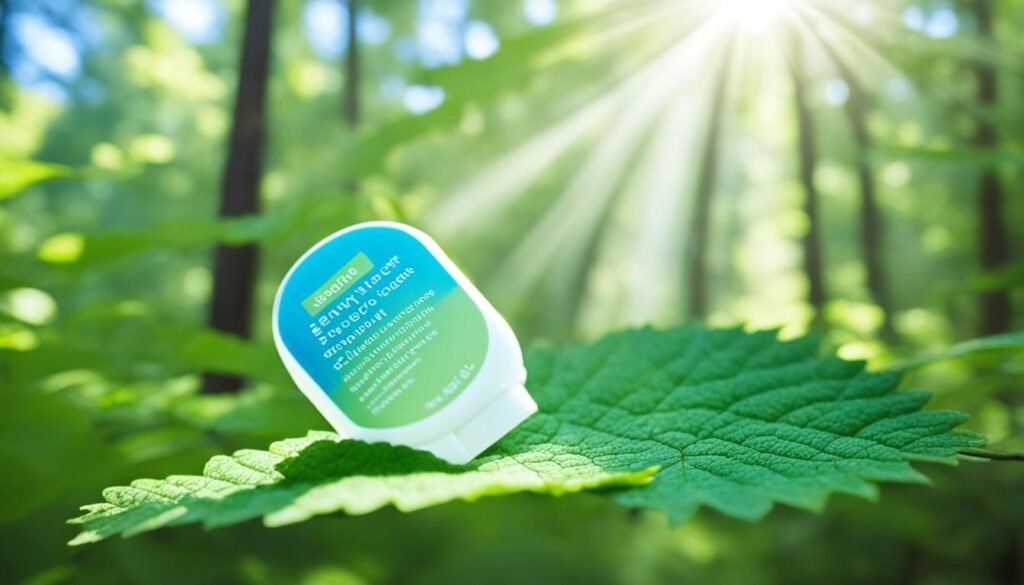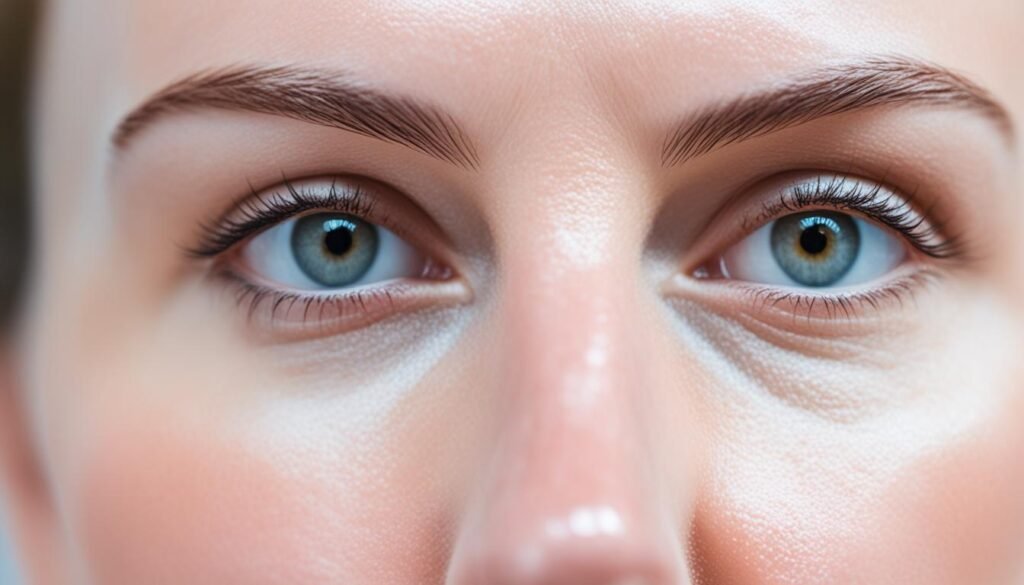Are you struggling with dry, acne-prone skin? Don’t worry, we’ve got you covered. In this article, board-certified dermatologist Dr. Jing (Jenny) Liu shares her amazing skin care routine specifically designed for dry acne-prone skin. With her gentle skincare practices and effective products, you can say goodbye to acne breakouts and hello to healthy, radiant skin.
Key Takeaways : Routine For Dry Acne Prone Skin
- Avoid harsh skincare practices and opt for gentle cleansers and mild exfoliators.
- Use vitamin C serums for antioxidant benefits and spot treatments for hyperpigmentation.
- Hyaluronic acid serums provide essential moisture for dry skin.
- Choose moisturizers that repair the skin barrier and provide hydration.
- Always protect your skin with a tinted sunscreen formula.
Why Does Dry Skin Still Get Acne?
Contrary to popular belief, acne is not reserved only for those with oily skin. Anyone can experience acne breakouts, including individuals with dry skin. Dry skin lacks essential moisture, which can stimulate the skin to produce more oil and result in clogged pores and acne breakouts. Factors such as age, genetics, hormones, and improper skincare practices can also contribute to acne breakouts on dry skin. It’s important to keep the skin properly moisturized and follow a consistent skincare routine to manage acne from dry skin effectively.
Dry skin may not produce as much oil as oily skin, but it can still experience acne breakouts. When the skin is excessively dry, it compensates by producing more oil to try and hydrate itself. This excess oil, combined with dead skin cells and impurities, can clog the pores and lead to acne breakouts.
Proper hydration is crucial for maintaining the balance of your skin. Using a gentle cleanser and moisturizer designed for dry skin can help replenish lost moisture and prevent the skin from overproducing oil. It’s also important to avoid harsh and drying skincare products that can strip the skin of its natural oils and disrupt the skin barrier.
Additionally, hormonal imbalances can contribute to acne breakouts in dry skin. Hormonal acne can occur due to fluctuations in hormone levels, such as during puberty, menstrual cycles, or menopause. These hormonal changes can affect the skin’s oil production and increase the likelihood of acne breakouts.
A consistent skincare routine is essential for managing acne in dry skin. Incorporating acne treatments that target excess oil and clogged pores, such as salicylic acid or benzoyl peroxide, can help prevent and treat acne breakouts. However, it’s important to use these treatments in moderation and avoid over-drying the skin.
Finally, following a skincare routine that includes gentle exfoliation and moisturization can help improve dryness and enhance skin cell turnover. Exfoliating regularly can remove dead skin cells, allowing new, healthier skin cells to surface. This can help improve the overall texture and appearance of the skin while reducing the likelihood of acne breakouts.
Remember, everyone’s skin is unique, and what works for one person may not work for another. If you’re struggling with acne breakouts on dry skin, it’s always a good idea to consult a dermatologist who can provide personalized recommendations and treatment options tailored to your specific needs.
Can Dry Skin Cause Acne?
Dry skin is often associated with flaking, tightness, and a lack of moisture. However, contrary to popular belief, dry skin can also contribute to acne breakouts. When the skin is dry, it compensates by producing excess oil to hydrate and protect itself. This excess oil can mix with dead skin cells and other impurities, clogging the pores and leading to acne breakouts.
It is crucial to keep the skin properly moisturized to prevent acne breakouts caused by dryness. Using a suitable moisturizer helps to replenish the skin’s moisture levels and maintain a healthy skin barrier. A well-hydrated skin barrier is less likely to produce excess oil, reducing the risk of clogged pores and acne breakouts.
Choosing the right moisturizer is essential for dry, acne-prone skin. Look for non-comedogenic formulas that won’t clog the pores and further exacerbate acne breakouts. Opt for moisturizers with ingredients like hyaluronic acid, glycerin, and ceramides, as these help to lock in moisture and restore the skin’s natural protective barrier.
By keeping your skin properly moisturized, you can effectively manage and prevent acne breakouts associated with dryness. Remember to choose a moisturizer suitable for your skin type and incorporate it into your daily skincare routine for optimal results.
Another factor to consider is the importance of maintaining a healthy and balanced skincare routine. Using harsh cleansing products or over-exfoliating can strip the skin of its natural oils, leading to dryness and an overproduction of oil. It is important to cleanse the skin gently and avoid harsh ingredients that can further irritate dry, acne-prone skin.
In addition to moisturizing and gentle cleansing, incorporating products that target acne specifically can help manage breakouts. Look for acne treatments that contain ingredients like salicylic acid or benzoyl peroxide. These ingredients can help exfoliate the skin, unclog pores, and reduce inflammation, addressing both acne breakouts and dryness simultaneously.
Remember, finding the right balance between treating acne and maintaining skin hydration is key. Consistency and patience are essential when managing dry, acne-prone skin. Stick to a skincare routine that includes moisturizing, gentle cleansing, and targeted acne treatments to achieve clear and healthy skin.
With the right approach and a little care, you can effectively address and manage acne breakouts caused by dry skin while maintaining a healthy skin barrier.
Can Acne Treatments Cause Dry Skin?
While acne treatments can effectively target acne breakouts, some treatments, particularly those containing benzoyl peroxide or salicylic acid, may cause dryness or flaking, especially when overused or applied incorrectly. These common acne-fighting ingredients are known for their effectiveness in treating acne, but they can disrupt the skin’s natural moisture balance when used excessively.
When benzoyl peroxide or salicylic acid is applied to the skin, they work by targeting acne-causing bacteria and exfoliating dead skin cells. However, in the process, they can also strip away the skin’s natural oils, leading to dryness and flaking.
It’s important to note that not everyone will experience dryness or flaking from acne treatments, as individual skin types and sensitivities can vary.
To prevent excessive dryness, it’s crucial to follow the instructions provided by the product manufacturer. These instructions will typically include recommendations for the frequency of use and the amount of product to apply. Overusing acne treatments can worsen dryness and potentially irritate the skin further.
Proper application techniques can also help minimize the risk of dryness and flaking. For example, when using benzoyl peroxide or salicylic acid, it’s important to apply a thin, even layer and avoid applying the product to unaffected areas of the skin. Additionally, using a moisturizer alongside acne treatments can help replenish lost moisture and minimize dryness.
If despite following proper application techniques and moisturizing, dryness and flaking persist, it is recommended to consult a dermatologist. A dermatologist can provide personalized advice on how to manage dry skin while effectively using acne treatments. They may recommend adjusting the skincare routine or offer alternative acne treatment options better suited for dry skin.
Remember, acne treatments can be an essential part of managing acne breakouts, but it’s important to strike a balance between treating acne and maintaining the skin’s overall health and hydration.
Here is an insightful table summarizing the potential impact of common acne treatments on dryness and flaking:
| Acne Treatment | Potential Impact on Dryness and Flaking |
|---|---|
| Benzoyl Peroxide | May cause dryness and flaking, especially when overused or applied incorrectly. |
| Salicylic Acid | Can lead to dryness and flaking if used excessively or applied incorrectly. |
| Other Acne Treatments | Other acne treatments may have varying effects on dryness and flaking. It’s important to follow product instructions and consult a dermatologist if concerns arise. |

How To Care for Dry, Acne-Prone Skin
A dedicated skincare routine can help manage acne from dry, acne-prone skin. It is essential to follow a consistent skincare routine that includes products suitable for dry, acne-prone skin. Supporting the skin’s protective barrier with products containing ceramides is crucial for maintaining healthy skin.
Start your routine with a hydrating acne cleanser to cleanse the skin without stripping it of its natural oils. Look for ingredients like hyaluronic acid, which can help retain moisture and prevent further dryness. Follow up with a gentle acne treatment that targets breakouts without causing irritation or excessive dryness. Look for ingredients like salicylic acid or tea tree oil, which have anti-inflammatory properties.
After treating acne, it’s important to moisturize the skin to replenish lost moisture and prevent dryness. Look for a lightweight moisturizer that contains ingredients like hyaluronic acid or ceramides, which help lock in moisture and strengthen the skin barrier. Avoid heavy or greasy formulas that can clog pores and worsen acne breakouts.

Remember to always use a sunscreen during the day to protect the skin from harmful UV rays. Look for a broad-spectrum sunscreen with an SPF of 30 or higher, and apply it generously to all exposed areas of the skin. Sunscreen helps prevent sunburn and reduces the risk of skin cancer, while also protecting the skin from premature aging and dark spots.
By following a skincare routine that addresses the specific needs of dry, acne-prone skin, you can effectively manage acne breakouts while keeping your skin hydrated and healthy.
| Skincare Routine for Dry, Acne-Prone Skin |
|---|
| 1. Cleanse the skin with a hydrating acne cleanser. |
| 2. Apply a gentle acne treatment to target breakouts without causing excessive dryness. |
| 3. Moisturize the skin with a lightweight moisturizer containing hydrating ingredients like hyaluronic acid or ceramides. |
| 4. Protect the skin with a broad-spectrum sunscreen with SPF 30 or higher. |
The Most Effective Acne-Fighting Ingredients
When it comes to combating acne, it’s essential to incorporate the right ingredients into your skincare routine. Here are three highly effective acne-fighting ingredients that can make a significant difference:
Salicylic Acid:
Salicylic acid is a beta-hydroxy acid known for its exfoliating properties. It works by penetrating the pores and helping to remove excess oil and dead skin cells. By gently exfoliating the skin, salicylic acid can unclog pores and prevent acne breakouts. Additionally, salicylic acid has anti-inflammatory properties, making it an excellent choice for reducing redness and swelling associated with acne.
Benzoyl Peroxide:
Benzoyl peroxide is a powerful ingredient that effectively kills the acne-causing bacteria within the pores. It works by introducing oxygen into the skin, creating an environment where bacteria cannot survive. Benzoyl peroxide is particularly effective in targeting and reducing the presence of whiteheads, blackheads, and pustules. However, it’s important to use benzoyl peroxide cautiously, as it can cause dryness and irritation if overused.
Retinoids:
Retinoids, such as adapalene, are derived from vitamin A and are renowned for their ability to accelerate skin cell turnover. By increasing the rate at which skin cells are shed and replaced, retinoids help to prevent clogged pores and promote a clearer complexion. They are also effective in reducing inflammation and improving the overall texture and appearance of the skin.
By incorporating these acne-fighting ingredients into your skincare routine, you can effectively address acne breakouts and promote a healthier complexion. Remember to start with a low concentration and gradually increase it to minimize any potential irritation. Consult with a dermatologist to determine the best approach for your skin type and concerns.

Is Benzoyl Peroxide Safe for Acne?
Benzoyl peroxide is a safe and commonly used ingredient in acne products. It has been proven effective in treating acne by reducing inflammation and killing acne-causing bacteria on the skin’s surface. However, recent studies have raised concerns about the potential generation of benzene in benzoyl peroxide products under certain conditions. Benzene is a known carcinogen and long-term exposure to high levels of benzene can be harmful to human health.
The U.S. Food and Drug Administration (FDA) regulates the safety of benzoyl peroxide products and sets limits for the amount of benzene that can be present. It is important to note that when used as directed and stored properly, benzoyl peroxide products are unlikely to release worrisome levels of benzene.
If you have any concerns about the safety and efficacy of acne products containing benzoyl peroxide, it is always recommended to consult a dermatologist. They can provide you with personalized advice based on your skin type, acne severity, and specific concerns.
When using benzoyl peroxide products, it is important to follow the instructions on the packaging:
- Start with a lower concentration to minimize potential irritation and dryness.
- Apply a thin layer of the product to the affected areas of the skin.
- Use the product consistently as part of your skincare routine.
- Do not overuse benzoyl peroxide, as it can cause excessive dryness and irritation.
- If you experience severe dryness or irritation, reduce the frequency of use or discontinue use and consult a dermatologist.
It is also important to note that benzoyl peroxide can bleach clothing and bedding, so be cautious when applying it and allow the product to dry before coming into contact with fabrics.

Overall, when used correctly, benzoyl peroxide can be a safe and effective acne treatment. However, if you have any concerns about its safety or if you experience severe dryness or irritation, it is best to consult a dermatologist for guidance.
The Best Skincare Routine to Prevent Adult Acne
Preventing adult acne requires a skincare routine that addresses acne while hydrating and protecting the skin barrier. By incorporating acne-fighting ingredients, incorporating a moisturizer, and using sunscreen daily, you can maintain healthy, clear skin.
Choose the Right Acne-Fighting Ingredients
To combat adult acne, look for skincare products that contain acne-fighting ingredients such as salicylic acid, benzoyl peroxide, and retinoids. These ingredients work to unclog pores, reduce inflammation, and prevent future breakouts. Incorporating these ingredients into your skincare routine can help manage acne effectively.
Hydrate with a Suitable Moisturizer
Hydration is crucial for maintaining healthy skin. Opt for oil-free and non-comedogenic moisturizers specifically formulated for acne-prone skin. These moisturizers provide hydration without clogging pores or exacerbating acne breakouts. Make sure to apply moisturizer after cleansing and treating your skin for acne.
Protect Your Skin with Daily Sunscreen
Using sunscreen daily is essential for protecting your skin from harmful UV rays. Look for a broad-spectrum sunscreen with an SPF of at least 30. Apply it generously to all exposed areas of your face and body, and reapply every two hours or as directed by the product label. Sunscreen helps prevent sun damage, which can worsen acne and lead to post-inflammatory hyperpigmentation.
Consistency and Patience
Consistency is key when it comes to managing adult acne. Stick to your skincare routine and give it time to work. Results may not be immediate, so be patient and continue with your regimen consistently. Avoid the temptation to over-cleanse or over-exfoliate your skin, as this can strip away essential oils and irritate your skin, leading to more dryness and breakouts.
Remember, a gentle approach is crucial for preventing adult acne. Be kind to your skin and avoid harsh products or aggressive skincare practices that can disrupt your skin’s natural balance. With time, patience, and the right skincare routine, you can effectively manage adult acne and maintain healthy, clear skin.

If you have acne-prone dry skin, it’s important to tailor your skincare routine accordingly to treat acne without exacerbating dryness. Using products specifically formulated for dry skin can help keep your skin hydrated while addressing acne concerns. Gentle skincare practices are crucial to prevent further dryness and contribute to overall skin health.
Avoid harsh acne treatments that can strip your skin of its natural moisture and worsen dryness. Instead, incorporate gentle acne treatments into your skincare regimen and remember to apply sunscreen to protect your skin from damaging UV rays. Be mindful of picking at acne, as this can lead to further irritation and inflammation. By maintaining a balanced skincare routine that addresses both dryness and acne, you can effectively treat your skin without causing further harm or discomfort.
Also Read : Morning Skincare Routine Tips for Radiant Skin
Conclusion
A well-rounded skincare routine is essential for effectively managing acne in individuals with dry, acne-prone skin. To address this concern, it is crucial to incorporate gentle cleansers, acne treatments specifically tailored for dry skin, moisturizers, and sunscreens into your daily routine.
Following a consistent skincare practice is key to achieving desired results. Patience is necessary as it may take some time to see improvements. Avoiding harsh skincare practices that can further exacerbate dryness and irritation is equally important.
By adhering to a gentle skincare routine that includes suitable products and maintaining a regular regimen, you can successfully manage acne and maintain healthy, hydrated skin.
FAQs
Q: What is a suitable skin care routine for dry acne-prone skin?
A: A suitable skin care routine for dry acne-prone skin should include gentle cleansing, hydrating products, acne treatments, and sunscreen.
Q: How do I maintain my skin barrier when treating acne on dry skin?
A: To maintain your skin barrier when treating acne on dry skin, opt for gentle products that do not strip the skin of its natural moisture.
Q: What are the best products for dry skin with acne?
A: The best products for dry skin with acne are hydrating cleansers, non-comedogenic moisturizers, acne treatments with ingredients like benzoyl peroxide or salicylic acid, and gentle exfoliants.
Q: How can I hydrate my skin while treating acne and dry skin?
A: You can hydrate your skin while treating acne and dry skin by using hydrating serums, moisturizers, and drinking plenty of water.
Q: Is it important to include sunscreen in a skin care routine for dry acne-prone skin?
A: Yes, it is important to include sunscreen in a skin care routine for dry acne-prone skin to protect your skin from damaging UV rays and prevent further skin issues.
Q: How can I treat acne when I also have dry skin?
A: To treat acne when you also have dry skin, use gentle acne treatments, hydrating products, and avoid picking at acne to prevent irritation.
Q: What are some common skin concerns for people with dry and acne-prone skin?
A: Some common skin concerns for people with dry and acne-prone skin include maintaining skin hydration, preventing dryness, treating acne without causing further irritation, and protecting the skin barrier.
